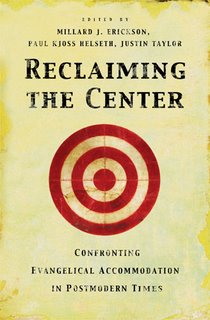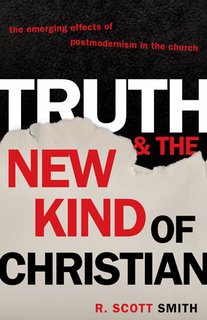Postmodern Idolatry (The Emergent Church)
 In the book Reclaiming the Center, R. Scott Smith explains the emergent view of truth that is held by some of its leaders such as Stanley Grenz, Brad Kallenberg, and Brian Mclaren. Smith explains how they do not believe objective truth is possible, because no truth statement we know or speak can actually correspond to reality. This is because language is a created barrier that keeps us from having access to the real world. Since all truth is formed in language, no truth can actually correspond to reality (i.e. we do not know things as they really are). Instead we create our truths, and make them what they are. One of their favorite things to say is, "we do not inhabit the world as it really is, instead we inhabit a linguistic world of our own making.
In the book Reclaiming the Center, R. Scott Smith explains the emergent view of truth that is held by some of its leaders such as Stanley Grenz, Brad Kallenberg, and Brian Mclaren. Smith explains how they do not believe objective truth is possible, because no truth statement we know or speak can actually correspond to reality. This is because language is a created barrier that keeps us from having access to the real world. Since all truth is formed in language, no truth can actually correspond to reality (i.e. we do not know things as they really are). Instead we create our truths, and make them what they are. One of their favorite things to say is, "we do not inhabit the world as it really is, instead we inhabit a linguistic world of our own making.After explaining this Smith makes this revealing comment…
"Therefore, no matter how God tries to reveal himself and objective truth, we cannot know such revelation in itself. Accordingly, we make the revelation what it is for us by how we talk about it. The same goes for God himself. We cannot know God as he is in himself, so we must make God by how we use our language. But that result is plainly idolatrous on the terms of conservative Christians’ own grammar, the Bible. If I am right, then that result alone ought to make us pause and give up these postconservative views. (127).”
In the book Truth and The New Kind of Christian he says it like this…

"Quite simply, Christians cannot know God as He is if we are on the “inside” of the pervasive influences of language, as these Christian postmodernist believe. Just like any other aspect of our “reality,” Christians construct God by how they talk. We make God into what He is—for us. This conclusion, however, results in the absurd condition that Christians must be idolaters (145)."
May their eyes be opened,
Doug



8 Comments:
Not only that, but their (PoMo) position is self-refuting because it must assume what it tries to deny, universal truth, in order to make their own "truth claims".
I would say Grenz, I met him btw, is (or was) of a different stripe than Mclaren--at least he was quite more informed than Mclaren is.
The point on idolatry is a good one! It's too bad that Christians feel the need to "use" the epistemology provided by PoMo categories of pragmatic/self-referentialist concepts! It reduces "truth" to a construct that only has legitmacy as a "meta-narrative" within the "community" that imbues it with its own meaning. Of course when this is applied to ethics, for example, it slips right into normative relativism. (PoMo's take Kantian ideas to seriously)
And least of all, as the idolatry point hits on, PoMo theories of truth, are incompatible with the correspondence theory of truth that the scriptures "assume" to communicate "truth".
IMO opinion, the Evangelical church is in a sad state on many fronts--both theologically and philosphically!
Good post, Doug!
IN Christ,
Bobby
P.S. Have you ever read "Beyond Foundationalism" by Grenz--it's a good read, and very informative relative to understanding where people like McLaren are coming from!
Doug,
I find this whole thing very sad. To think there are professing christians who say we cannot know God or the truth. They make their own "Truth", which is really a lie.
Great writing.
This comment has been removed by a blog administrator.
I totally disagree that we cannot know God as He really is, that we cannot know truth or Truth. As Christians we must know Truth, the two are synonomous. I do however relate to the point that all of mankind sees and thinks through a particular matrix and that is the lense through which he tries,however feebly, to convey the truth that he sees internally. This is indeed the basis of all thological discussion, bible study, sermons, etc. The greatest feat ever accomplished by man is that of making the invisible Truth visible in this realm. It is a rare gift to be able to make Christ visible. But language or no...when you see HIm you know it though your conveyance of HIm may be taintied by your environment or your matrix.
Jada's girl: good points, but I have a question for you!
You said:
"when you see HIm you know it though your conveyance of HIm may be taintied by your environment or your matrix."
What do you think of the incarnation, when Jesus "enculturated" Himself in the man of Nazareth. Did time/space taint Him?
I don't believe time/space/socio/cultural realities necessarily have to taint our language about God, because God is able to work in and through our weak language. I actually believe our language about God, through His Word, is univocal--i.e. that our language actually and directly captures aspects of God's character (i.e. He is love); not just analogical (as PoMo would assert or even equivocal). God has redeemed our culture and language, as much as He's provided redemption for man (Rom. 8).
In Christ,
Bobby G.
Proverbs 30:5 says that, "Every word of God is pure: He is a shield unto them that put their trust in him."
Matthew Henry wrote some 300 years ago that this scripture is to assure us of the truth of the word of God, and to recommend it to us. He noted that the pupils of Agur (the teacher in this proverb) expected to be instructed by Agur in the things of God. "Alas!’’ says Agur, "I cannot undertake to instruct you; go to the word of God; see what he has there revealed of himself, and of his mind and will; you need know no more than what that will teach you, and that you may rely upon as sure and sufficient. Every word of God is pure; there is not the least mixture of falsehood and corruption in it.’’
Brother Henry noted that the words of men are to be heard and read with jealousy and with allowance, but there is not the least ground to suspect any deficiency in the word of God; it is as silver purified seven times Ps. 12:6, without the least dross or alloy. Thy word is very pure, Ps. 119:140.
Matthew Henry continued by noting that, "The Word of God is sure, and therefore we must trust to it and venture our souls upon it. God in his word, God in his promise, is a shield, a sure protection, to all those that put themselves under his protection and put their trust in him. The word of God, applied by faith, will make us easy in the midst of the greatest dangers, Ps. 46:1-2."
With all due respect, I'll stick with Brother Henry on this issue. Words with moveable meanings have no meaning at all. God's richest blessings upon all who walk not in the vanity of their minds.
Bill,
Well said,
Doug
BG
I don't think Christ was tainted by His immersion in time and space at all. I believe that His matirx was higher and came before His incarnation. He was His Father's Son from eternity past, His Father was and is His matrix. He said HImself that He did nothing except what He saw the Father do.
Living as a human being in 1st century Nazareth did however influence His communication...He chose fishermen, he spoke in parables of common men, farming, fishing, eating drinking, plain language...very relative to the environment He was walking. So do we. Language is a powerful tool for communication but certainly not perfect and yes God can use any and everything and does...He certainly works in our language and our matrix...In my experience He redeems everything in His time, nothing is wasted and He uses all things, even satan himself to get His point across...He's is a very big God. :)
Post a Comment
<< Home